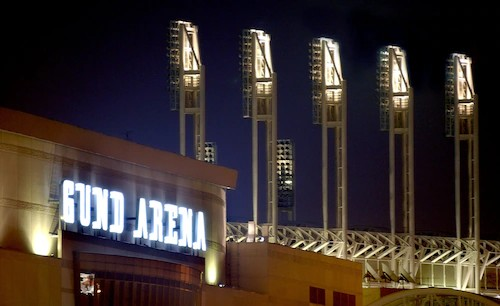
In this 2002 photo, the lights from what was then known as Gund Arena, and Jacobs Field behind it, beckon sports fans to the Gateway complex. Columnist Leslie Kouba writes that Cleveland's costly and longtime entanglement with the Gateway complex underscores how misguided public investments in professional sports fail to deliver promised economic benefits.The Plain Dealer
By Leslie Kouba, cleveland.com
CLEVELAND, Ohio -- Let’s talk about the complicated codependent relationship between the city of Cleveland, Cuyahoga County, our professional sports teams and the Gateway Economic Development Corporation. It’s a perfect example of how basing long term profitability on uncontrollable projections, wishful thinking and the erroneous belief that pro sports are economic boosters can really fail.
This cluster is rooted in the late 1800s, when baseball emerged as America’s pastime and businesses saw opportunity. Example – tobacco companies included trading cards in cigarette packs to increase sales. In the early 1900s, public money started to help build sports facilities for the Olympics. In 1951, then-baseball commissioner Ford Frick told cities they had to support their teams, because the teams brought so much money into their communities.
In the early 1980s, after a century of monetized professional sports, government officials started singing the song they had been taught – that pro sports teams and their stadiums/fields/arenas were economic development magic for struggling urban areas. But remember, everything always comes down to money and power.

Comments